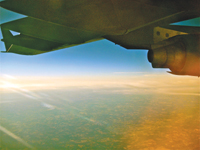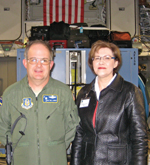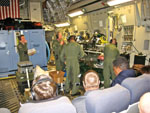|
|
|

|
Handling Deployment
|
 US Air Force Boss Lift program
offers taste of reserve life US Air Force Boss Lift program
offers taste of reserve life
By Cindy Abole
Public Relations
Outpatient Neurosciences nurse manager Deb Adams has a newfound
appreciation for nurse and weekend warrior Rick Bennett.
Adams met Bennett for the first time last fall after completing a
four-month military deployment with the 315th Airlift Wing, Joint Base
Charleston. Bennett is a 29-year Air Force Reserve master sergeant and
flight medic assigned to the 315th Aeromedical Evacuation (AME)
Squadron.
In December, Bennett invited Adams to participate in the U.S. Air
Force’s (USAF) Boss Lift program, Jan. 13-14. Adams was selected as an
alternate and later chosen to make the flight experience. The program
allows employers and civic leaders to participate in a two-day training
mission, educational program and readiness demonstration showcasing the
skills and medical training needed to perform life-saving medical
transport missions.
 Adams believes
the Boss Lift program draws employers and community leaders together as
they continue to support hundreds of thousands of working men and women
who also serve in uniform. Adams believes
the Boss Lift program draws employers and community leaders together as
they continue to support hundreds of thousands of working men and women
who also serve in uniform.
Master
Sgt. Rick Bennett and neurosciences nurse manager Deb Adams during the
Jan. 13 Boss Lift.
“The experience certainly provided me with a glimpse of how these brave
individuals conduct their mission while holding down the responsibility
of family and full-time jobs, and other community commitments. Their
dedication to serve our country as well as other responsibilities is
admirable,” said Adams, who has worked 17 years as an MUSC nurse.
Bennett, who trains monthly with the reserves, also was pleased Adams
committed to this rare experience. A Charleston native and experienced
veteran of several campaigns from Desert Shield and Storm to Operation
Iraqi Freedom and Enduring Freedom, Bennett had offered this experience
to previous managers. Adams was the first manager to jump at the
opportunity.
On Jan. 13, Adams reported at 6:30 a.m. to the Charleston Air Force
Base (AFB) to meet with other Lowcountry participants for the trip.
Luckily, Bennett’s squadron was training simultaneously and was
assigned with the Boss Lift mission. The itinerary began with a stop at
the 919th Special Operations Wing at Duke Field, Fla., to retrieve more
participants before proceeding west to Nellis AFB, just outside of Las
Vegas.
During the three-hour flight, participants watched as Bennett and the
315th’s Aeromedical Evacuation crew practiced and demonstrated their
skills in treating and caring for critically ill or injured airmen or
soldiers who were being transported for specialized medical care. The
five-person AME team consists of a medical crew director, flight nurse
and three medical technicians. They are experienced at providing
comprehensive patient care and related tasks in flight within a
configured cargo hold of a massive C-17 Globemaster III—one of several
aircraft the squadron uses on its missions. The C-17 is considered a
multipurpose military transport plane that can transport troops and
cargo over long distances.
 Flight medic Tech.
Sgt. Wesley Pinner, left, describes the activities
performed by members of the 315th Aeromedical Evacuation team as they
conduct a training scenario in flight aboard a C-17 Globemaster III. Flight medic Tech.
Sgt. Wesley Pinner, left, describes the activities
performed by members of the 315th Aeromedical Evacuation team as they
conduct a training scenario in flight aboard a C-17 Globemaster III.
Upon arrival at Nellis AFB, the group met for lunch, attended multiple
briefings and demonstrations and toured the base. Nellis is home to the
Air Force’s Air Combat Command, weapons school and its Air
Demonstration Squadron, or the Thunderbirds.
Among Adams’ trip highlights were a tour of the Thunderbirds facility,
a demonstration of the Air Force’s
MQ-1 Predator program—unmanned vehicles used for surveillance and
attack missions in the war theater, and a flyover of the Grand Canyon.
Since 9-11, MUSC and a majority of employers around the country have
shared a favorable attitude with employees who work in the National
Guard and Reserves. Overall, many have learned how to manage prolonged
absences and increased workloads during a reservist-employee’s
deployment, according to June Darby, R.N., Neuroscience Service Line
administrator.
Darby, Adams and other nurse managers have relied on various resources
such as the Medical University Flexibility team in providing temporary
staffing support during an employee’s absence. The medical center
supports more than 60 reserve-employees.
“It was a chance of a lifetime to see what happens, especially the
reserve training. I was both thrilled and honored in participating with
this program,” Adams said.
Within MUSC’s Neurosurgery and Neurosciences work area, Bennett is
joined by three colleagues who also are military reservists—Michelle
Baxter, 9 West, Gary “Beau” Mahanes, R.N., MUSC Stroke Program
coordinator, and Mark McCaslin, clinical unit leader, Neurosciences
Intensive Care Unit.
Darby said the Boss Lift program is helpful for employers to better
understand the job an employee performs while he or she is deployed.
“It helps an employee share their military life with their manager and
co-workers so they can understand their role and significance during
the time that they are away.”
Friday, Feb. 25,
2011
|
|
|



 US Air Force Boss Lift program
offers taste of reserve life
US Air Force Boss Lift program
offers taste of reserve life Adams believes
the Boss Lift program draws employers and community leaders together as
they continue to support hundreds of thousands of working men and women
who also serve in uniform.
Adams believes
the Boss Lift program draws employers and community leaders together as
they continue to support hundreds of thousands of working men and women
who also serve in uniform.